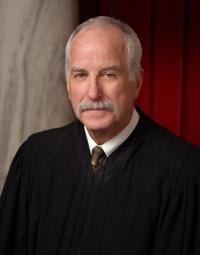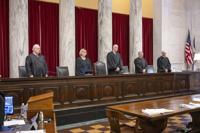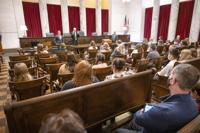West Virginia Chief Justice Hutchison: ‘Main priority to continue the progress’ | WV News
[ad_1]
CHARLESTON, W.Va. (WV News) — When John A. Hutchison was coaching college basketball in the 1970s, teaching and coaching in Raleigh County in the same time period or working as a construction laborer, carpenter’s helper and steelworker on a New River bridge, it’s doubtful anyone would have pegged him for the job he has today.
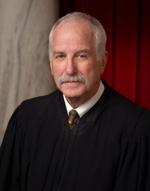
Hutchison
Yet here he is in his early 70s, framed by those experiences and many others, stepping in as chief justice of the West Virginia Supreme Court in what’s arguably one of the most important times in its history.
The Supreme Court, not that far removed from a scandal that rocked its core — and which Hutchison had nothing to do with — now is charged with paving the way for the brand new Intermediate Court of Appeals.
And at the same time, Hutchison and his colleagues on the state’s highest court must make sure the judiciary continues to operate smoothly. That’s no small feat, with the pandemic entering its third year and with the impacts of the opioid crisis that raged here coming home fully to roost in a plethora of abuse and neglect cases.

Chief Justice John Hutchison speaks with social studies students at Buckhannon-Upshur Middle School about the West Virginia Court System. December 6, 2021.
On the basketball court, in construction, as a lawyer and as a longtime Raleigh County circuit judge, Hutchison learned a long time ago that teamwork is critical to success.
So when he talks about initiatives that he’s charged with leading, it isn’t surprising that he frequently interjects “we” instead of “I.”
“The main priority is to continue the progress that we’re making and have been making over the last several years. Obviously, trying to manage the implementation of the Intermediate Court of Appeals is a big project. But we’re also trying to continue a bunch of stuff and to develop a bunch of stuff,” Hutchison told WV News/The State Journal recently.
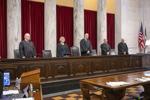
Chief Justice John A. Hutchison, center, wants to continue the progress the court has made.
“For example, creating hybrid courtrooms where we can use the experience that we gained from COVID to use more technology,” Hutchison said. “What that does, it makes the courts more accessible to folks. We’re trying to give people the option. If they want to go into the courtroom, that’s fine, but a lot of times it’s difficult for them. So we’re trying to continue to expand our use of hybrid courtrooms.
“The other thing we’re doing — and I want to continue — is to continue to work with and cooperate with the Division of Corrections and Rehabilitation to get more remote equipment in the jails so that prisoners who need to appear for hearings, where it’s appropriate, that we have an appropriate amount of equipment at each jail so that judges and lawyers and everybody can meet with and interact with those prisoners.
“You know, that does a lot for the Division of Corrections. They don’t have to transport people as much. It’s safer because you don’t have them out on the roads in vehicles. It’s safer for the [Division of Corrections and Rehabilitation] employees because they’re not having to be out on the roads with prisoners. So that helps a lot.
“And another thing that we’re trying to get going — and I really want to continue to do this, and a lot of this stuff is technology-centered — but the magistrate payment portal, which is a method whereby people could use their credit cards to pay magistrate fines, fees, restitution that sort of stuff. And it makes it a lot easier for the magistrate clerks and the magistrates themselves to be able to manage and account for all the money that comes in. So, that’s a big thing that we’re still working on.
“We have a lot of programs that we’re trying to move out. We’re trying to expand our family treatment courts, make sure that the juvenile and adult drug courts and the veterans courts have enough resources to do what they need to do. We’re continuing to push on those kinds of things. It’s really to carry on the good work that was started before I got here and hopefully bring a lot of it some conclusion, especially the Intermediate Court of Appeals, getting that set up.”
The Legislature passed a bill creating the Intermediate Court of Appeals last year, and Gov. Jim Justice signed the measure into law April 9.
The law establishes a three-judge panel; the judges eventually will serve staggered terms lasting 10 years.

Chief Justice John A. Hutchison speaks with social studies students at Buckhannon-Upshur Middle School about the West Virginia Court System on Dec. 6, 2021.
The first group of judges appointed by Justice are attorneys: Thomas Scarr of Huntington (term ending Dec. 31, 2024); Daniel Greear of Charleston (term ending Dec. 31, 2026); and Donald Nickerson Jr. of Wheeling (term ending Dec. 31, 2028).
The Intermediate Court of Appeals will hear: Appeals from circuit courts in civil cases and those concerning guardianship or conservatorship; appeals from family courts, except for appeals from domestic violence proceedings, which will still go through circuit court; appeals from state agencies or administrative law judges; and appeals from decisions or orders issued by the Workers’ Compensation Office of Judges after June 30, until its termination, and from orders or decisions of the Workers’ Compensation Board of Review after June 30.
“We are currently identifying space for them,” Hutchison said. “We have a technology committee that’s working on making sure they have all the most up-to-date technology. We have the Human Resources Committee working, deciding how many employees and how do we need to bring them on. We’re not going to need everybody July 1, and we’re going to need some people before July 1. So trying to come up with a plan to bring those folks in and starting to work when they’re needed and when they can do the most good.
“We’re also working on identifying remote locations. I talked a little bit about hybrid courtrooms. One of the problems that the Intermediate Court’s going to have is a huge number of the cases that they’re going to be hearing appeals on will deal with self-represented litigants, no lawyers,” Hutchison said.

Students from Raleigh and Wyoming counties participating in the 8th Grade Youth in Government program visit with Chief Justice John Hutchison and Justice Tim Armstead in the Supreme Court courtroom at the West Virginia Capitol in Charleston, WV, Jan. 31.
“And we got to thinking it would be really tough for a 15- to 20-minute hearing to have some individual have to drive from Berkeley County to Charleston or something like that. So we are trying to identify and trying to work on agreements where we could have courtrooms set up where the parties would go in and appear remotely in front of the judges who would all be together,” Hutchison said.
“And the idea was, what kind of road system would be there, what kind of parking might be available and the locations are designed so that nobody would have to drive any more than an hour and a half to get there. So we’re working on that and making a whole lot of progress. We’re working on electronic filing for the Intermediate Court of Appeals and moving forward with those contracts and identifying the vendors for those so that everything filed in the Intermediate Court of Appeals would be done electronically. And that way it saves a lot of paper, it saves a lot of storage space and it makes it more convenient for folks that may want to work remotely,” Hutchison said.
“And so we’re moving along on that. … Somewhere in the middle of March, get the Advisory Council that [former chief justice Evan] Jenkins organized, we’re going to get those guys in. We’ve had our clerks looking at and making suggested changes to all the rules that we have, court rules that would apply to the Intermediate Court of Appeals. And those are going out for public comment … So lots of, lots of behind-the-scenes kind of work. You know, where are they going to have offices? Where’s the courtroom going to be? We’re working on the remote courtrooms, working on rules. And the big thing is, you know it’s hard to get computer equipment right now because of the delays. So we’re trying to identify what we’re going to need so we can get it ordered, so it can be here when we need it. So lots of stuff like that going on,” Hutchison said.
Status quo on COVID policy
Hutchison predicts mostly the status quo on the judiciary’s COVID policy.
“It’s probably going to stay pretty much the same unless there is some identifiable issue that needs to be dealt with. What we did was we initially had policies that were fairly stringent and fairly centralized in the court. And then as COVID started to ease what we’ve done is we’ve sent that decision-making out to the local judges, and in the circuits and in the counties where they work. Because you know as well as I do, Kanawha County is going to need something different than Ohio County, for example, or Berkeley County,” Hutchison said.
“So those judges under our current policies have a lot of leeway in terms of how they’re going to handle COVID emergencies, I guess is what I would call it. But the one thing that we are pushing is use of technology and remote hearings. A lot of judges, especially in abuse and neglect cases, are using remote technology. And one example is, a guardian ad litem who might be working in two or three different counties, if he can appear remotely, he can save traveling to two or three different counties and do his remote hearings from a central location, which makes it a lot easier on those guys,” Hutchison said.
“We are encouraging use of technology in all hearings where it’s appropriate. Now some hearings, criminal hearings, for example, it may not be appropriate, constitutionally or legally, to not have the person actually in person in the courtroom. But there are a lot of things that can be done in criminal cases where the defendant can appear remotely either from jail or from some other location where he may be on bond. But it’s working out and we’re pushing that kind of thing,” Hutchison said.
Hutchison, a 1980 graduate of the WVU College of Law, was appointed as Raleigh County circuit judge in 1995 by then-governor Gaston Caperton. Hutchison was elected in 1996, 200, 2008 and 2016 before his appointment to the state Supreme Court in 2018 and election in 2020 to a term ending Dec. 31, 2024.
So, Hutchison has seen a lot during his time on the bench.
“We talk a lot about that among ourselves, the judges, people who have been judges and circuit court judges. There are two things that have substantially changed the practice of being a circuit judge or even a family court judge. Technology is one of them. Technology has made it easier for judges and lawyers to control their dockets and control what’s going on,” Hutchison said.
“Several years ago, it would have been unheard of for a lawyer to appear at a hearing via telephone or via computer. Now it’s commonplace, and judges have had to step up, learn the technology and learn how it can work for them. The other thing that has changed over the years substantially is abuse and neglect. I have seen in my career a huge change in the way we deal with abuse issues,” Hutchison said.
“I mean, since I’ve been on the bench the court has developed and adopted special rules for handling abuse and neglect cases. The real problem with abuse and neglect cases relates to the number of required hearings that you have to have and the timelines because, you know, you can’t just allow abuse and neglect cases to go on and on and on,” Hutchison said.
“You’ve got to get them through a process and get a final decision made. And so the social aspect of judging has changed substantially since I became a judge in 1995. And to their credit, all judges that I know have worked through that and understood their responsibilities in trying to deal with the social impacts of cases, especially abuse and neglect cases. Those two things probably are the biggest things that have changed since I’ve been on the bench,” Hutchison said.

Justice Tim Armstead, left, and Chief Justice John Hutchison met with Amelia Smith Rinehart, right, dean of the West Virginia University College of Law, and Nicole McConlogue, Clinical Program Director at the WVU College of Law, at the Supreme Court of Appeals courtroom in Charleston last Aug. 5.
“And I would tell you that the training that we’re able to give circuit judges and family court judges as it relates to appropriately dealing with the social aspects and with the development of specialty treatment courts, the veterans court, juvenile and adult drug court, and our new family treatment courts — all of those are in response to the social needs of justice. It’s become more of a looking at a way to resolve the problem through social change, as opposed to being punitive. And we have seen some great success along those lines,” Hutchison said.
“Judges in the state of West Virginia not only deal with the cases in their counties, but they also volunteer to do things like Mass Litigation Panel and the Business Court and family treatment courts. All of that’s voluntary. And the judges, almost to a man in the state of West Virginia, have been willing to step up and deal with more than just what’s going on in their counties,” Hutchison said.
“They understand they’re judges in the state of West Virginia, and that there are ways that they can participate in this branch of government that has a positive impact upon the entire state. And so I’m really proud of the judges that we have at all levels. For the most part, they do the right thing, they do it day after day and they’re willing to step out and take on additional responsibility. If we didn’t have that type of cooperation, it would be very difficult to run this branch of government, I can tell you that.”
[ad_2]
Source link
